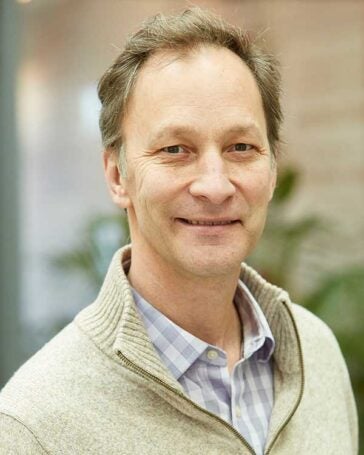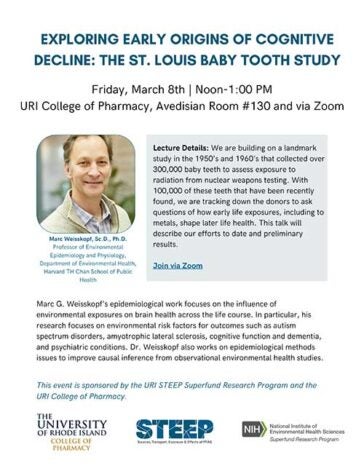 Date: Friday, March 8th, 2024
Date: Friday, March 8th, 2024
Time: Noon -1:00 PM
Location: URI College of Pharmacy, Avedisian Room #130
Host: University of Rhode Island STEEP Superfund Research Program
Marc Weisskopf, Sc.D., Ph.D.
Professor of Environmental Epidemiology and Physiology
Department of Environmental Health, Harvard TH Chan School of Public Health
Lecture Details: We are building on a landmark study in the 1950’s and 1960’s that collected over 300,000 baby teeth to assess exposure to radiation from nuclear weapons testing. With 100,000 of these teeth that have been recently found, we are tracking down the donors to ask questions of how early life exposures, including to metals, shape later life health. This talk will describe our efforts to date and preliminary results.
 Marc G. Weisskopf, Ph.D., Sc.D., is the Cecil K. and Philip Drinker Professor of Environmental Epidemiology and Physiology at the Harvard T.H. Chan School of Public Health in the departments of Environmental Health and Epidemiology, Director of the Harvard TH Chan NIEHS Center for Environmental Health, Co-Director of the JPB Environmental Health Fellowship Program at Harvard, and Director of Epidemiological Studies for the Football Players Health Study at Harvard. Dr. Weisskopf received his Ph.D. in Neuroscience from the University of California, San Francisco, and his Sc.D. in Epidemiology from the Harvard T.H. Chan School of Public Health. He also spent two years as an Epidemic Intelligence Service Officer with the Centers for Disease Control and Prevention working on environmental health issues in the Wisconsin State Health Department. His neuroscience work focused on molecular and cellular aspects of neural signaling and plasticity. His epidemiological work focuses on the influence of environmental exposures on brain health across the life course. In particular, his research focuses on environmental risk factors for outcomes such as autism spectrum disorders, amyotrophic lateral sclerosis, cognitive function and dementia, and psychiatric conditions. Dr. Weisskopf also works on epidemiological methods issues to improve causal inference from observational environmental health studies.
Marc G. Weisskopf, Ph.D., Sc.D., is the Cecil K. and Philip Drinker Professor of Environmental Epidemiology and Physiology at the Harvard T.H. Chan School of Public Health in the departments of Environmental Health and Epidemiology, Director of the Harvard TH Chan NIEHS Center for Environmental Health, Co-Director of the JPB Environmental Health Fellowship Program at Harvard, and Director of Epidemiological Studies for the Football Players Health Study at Harvard. Dr. Weisskopf received his Ph.D. in Neuroscience from the University of California, San Francisco, and his Sc.D. in Epidemiology from the Harvard T.H. Chan School of Public Health. He also spent two years as an Epidemic Intelligence Service Officer with the Centers for Disease Control and Prevention working on environmental health issues in the Wisconsin State Health Department. His neuroscience work focused on molecular and cellular aspects of neural signaling and plasticity. His epidemiological work focuses on the influence of environmental exposures on brain health across the life course. In particular, his research focuses on environmental risk factors for outcomes such as autism spectrum disorders, amyotrophic lateral sclerosis, cognitive function and dementia, and psychiatric conditions. Dr. Weisskopf also works on epidemiological methods issues to improve causal inference from observational environmental health studies.

